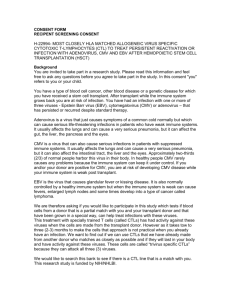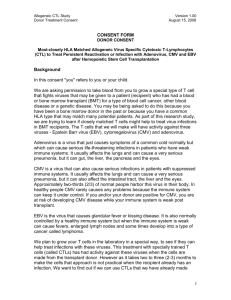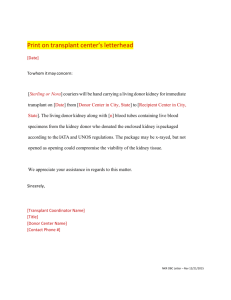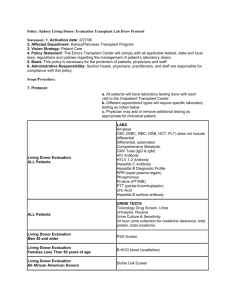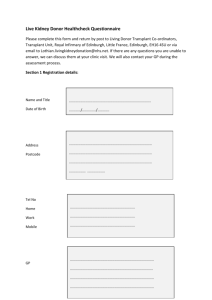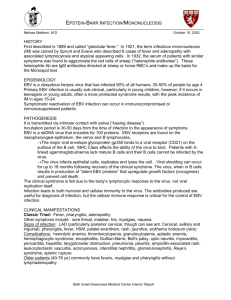Sample Recipient Treatment Consent
advertisement
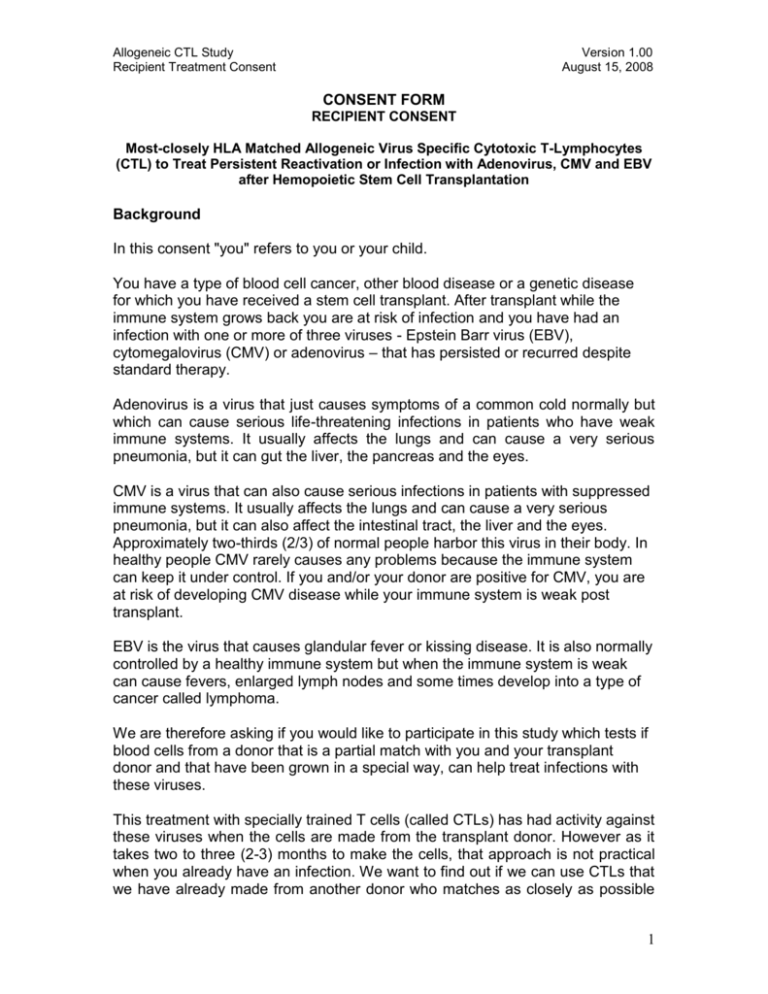
Allogeneic CTL Study Recipient Treatment Consent Version 1.00 August 15, 2008 CONSENT FORM RECIPIENT CONSENT Most-closely HLA Matched Allogeneic Virus Specific Cytotoxic T-Lymphocytes (CTL) to Treat Persistent Reactivation or Infection with Adenovirus, CMV and EBV after Hemopoietic Stem Cell Transplantation Background In this consent "you" refers to you or your child. You have a type of blood cell cancer, other blood disease or a genetic disease for which you have received a stem cell transplant. After transplant while the immune system grows back you are at risk of infection and you have had an infection with one or more of three viruses - Epstein Barr virus (EBV), cytomegalovirus (CMV) or adenovirus – that has persisted or recurred despite standard therapy. Adenovirus is a virus that just causes symptoms of a common cold normally but which can cause serious life-threatening infections in patients who have weak immune systems. It usually affects the lungs and can cause a very serious pneumonia, but it can gut the liver, the pancreas and the eyes. CMV is a virus that can also cause serious infections in patients with suppressed immune systems. It usually affects the lungs and can cause a very serious pneumonia, but it can also affect the intestinal tract, the liver and the eyes. Approximately two-thirds (2/3) of normal people harbor this virus in their body. In healthy people CMV rarely causes any problems because the immune system can keep it under control. If you and/or your donor are positive for CMV, you are at risk of developing CMV disease while your immune system is weak post transplant. EBV is the virus that causes glandular fever or kissing disease. It is also normally controlled by a healthy immune system but when the immune system is weak can cause fevers, enlarged lymph nodes and some times develop into a type of cancer called lymphoma. We are therefore asking if you would like to participate in this study which tests if blood cells from a donor that is a partial match with you and your transplant donor and that have been grown in a special way, can help treat infections with these viruses. This treatment with specially trained T cells (called CTLs) has had activity against these viruses when the cells are made from the transplant donor. However as it takes two to three (2-3) months to make the cells, that approach is not practical when you already have an infection. We want to find out if we can use CTLs that we have already made from another donor who matches as closely as possible 1 Allogeneic CTL Study Recipient Treatment Consent Version 1.00 August 15, 2008 and if they will last in your body and have activity against these viruses. These cells are called “trivirus specific CTLs” because they can attack all three (3) viruses. Purpose The purpose of this study is to find if trivirus specific CTLs from a donor who matches you as closely as possible can help to treat your viral infection and how long they last in your body. Procedures You will be one of approximately 45 subjects to be asked to participate in this trial. The research will be conducted at the following location(s): Baylor College of Medicine, TCH: Texas Children's Hospital, TMH: The Methodist Hospital; MD Anderson Cancer Center, Duke University, Children’s Hospital of Los Angeles, Massachusetts General Hospital and Dana Farber Cancer Center. If you wish to consider this study your doctor will first look in a database to see if there is a CTL line that is a close match with you and your donor using your HLA type which measures six (6) proteins on the surface of your cells. These CTL lines have been made at Baylor College of Medicine from donors for other transplant patients or other normal donors from the National Marrow Donor Program. All donors have been screened in the same way that we screen blood donors. When the CTL lines were made blood was taken from the donors and used to grow T cells. To do this we first infected blood cells called monocytes with a specially produced adenovirus gene that also carries part of the CMV gene. These monocytes with these new genes then stimulate the T cells. This stimulation will train the T cells to kill cells with this part of the CMV virus or with adenovirus. We then grow these CTLs with more stimulation with EBV infected cells (which we will make from donor blood by infecting them with EBV in the laboratory). We will also put the adenovirus that carries the CMV gene into these EBV infected cells so that they too have CMV and adenovirus proteins. These EBV infected cells will be treated with radiation so they cannot grow. By this type of culture, we grow out T cells that can see and attack cells infected with EBV, adenovirus or CMV. Once we have made sufficient numbers of T cells, we will test them to make sure they kill cells infected with these viruses and freeze them. If there is a line that matches at some HLA proteins with you, it will be shipped to your transplant center. It will then be thawed and injected into your intravenous line over one to five (1-5) minutes after you received Benadryl and Tylenol. We will monitor your levels of these three viruses in your blood and also take blood to see how long the cells are lasting. All participants on this study will get the same dose of cells. However if you have a partial response of your viral infection your doctors may offer you up to 4 more 2 Allogeneic CTL Study Recipient Treatment Consent Version 1.00 August 15, 2008 doses at 2 weekly intervals. You will continue to be followed by your transplant doctors after the injection. You will either be seen in the clinic or you will be contacted by a research nurse to follow up for this study every week for four six (6) weeks and three (3), six (6), nine (9), and 12 months. You may have other visits for your standard care. You will also have regular blood tests done to follow your counts and the viral infection. To learn more about the way the T cells are working in your body, an extra 20-40 mLs (four to eight (4-8) teaspoons) of blood will be taken before the infusion and then at two (2) and four (4) weeks and three (3) months. Blood should come from the central intravenous line, and should not require extra needle sticks. Any left over samples of tissue (blood) may be used to help research. The specimens may be kept for a long time. These specimens and information about your circumstances may be shared with other cancer researchers. Although there will be a record identifying under what circumstances these specimens were obtained, under all circumstances your identity will be kept confidential. Because the monocytes (or dendritic cells) and EBV infected cells that were used to train the donor's T cells had a gene put in them, we will need to follow you for one (1) year. You will either be seen in the clinic or you will be contacted by a research nurse. In the event of death, we will request permission to perform an autopsy to learn more about the effects of the treatment on your disease. You can see and get a copy of your research related health information. Your research doctor may be able to provide you with part of your information while the study is in progress and the rest of your information at the end of the study Potential Risks In our studies, similar types of T cells made from the transplant donor have been given to over 100 patients to prevent EBV lymphoma after transplant and to 28 patients to prevent infection with all three (3) viruses. Other investigators have also given these cells to over 100 patients. Cells from a most-closely matched donor have been given to over 50 patients in several studies. Most patients had no side effects. In some patients with large EBV tumors the cells have caused inflammation leading to fever and flu-like symptoms as well as swelling at the tumor site. This swelling could be potentially dangerous and even life threatening depending on the site. There is a possibility that body organs like the liver or kidney could be damaged if the cells cause inflammation. There is also a possibility that these T cells might try to attack other parts of your body and cause graft versus host disease (GVHD). GVHD occurs when cells from your bone marrow donor (graft) recognizes that your body tissues (host) are different from those of the donor. When this happens, cells in the graft may attack the host's skin, liver and intestines. If you have bad GVHD after the 3 Allogeneic CTL Study Recipient Treatment Consent Version 1.00 August 15, 2008 transplant, you will not be able to get the T cells. If you have GVHD after the T cells have been given, we will treat you with steroids and other medicines. Sometimes though GVHD can be hard to treat and does not respond to treatment. It can even cause death. There is also a possibility that the cells may not last very long because they are not completely matched and your immune system may be able to see they are foreign and kill them. In this study we are using adenovirus to put a gene into monocytes and EBV infected cells that will be used in the laboratory to stimulate the T cells. As the T cells will be grown for several weeks after contact with the monocytes and several days after contact with the EBV infected cells we think it is very unlikely that any adenovirus or monocytes or EBV infected cells will be injected with the T cells. However, should you receive any adenovirus it may cause an inflammatory reaction. There is one report of a patient who received a large dose of adenovirus into a blood vessel leading to his liver who died. Another risk is that the cell line that we have infected with EBV and used to stimulate the T cells or the EBV virus will be injected with the T cells. We think this is very unlikely and we will also test the T cells before we use them to reduce the likelihood that any of your cells that we have infected with EBV will be injected with the T cells. Possible side effects from drawing blood may include pain or bruising at the site of the needle puncture. There is a very small risk of an infection at the site of the needle puncture. Also, it is possible that a person may faint when blood is drawn. Care will be taken to clean the site well and therefore decrease the risk of infection. Because of potential or unknown effects of the study on a fetus, if you are a woman of child-bearing potential, you must have a negative serum pregnancy test prior to entry into this study. You have been informed that either you or your partner(s) must utilize one of the more effective birth control methods during the study and for six months after the study is concluded. These consist of total abstinence, oral contraceptives, an intrauterine device, contraceptive implants under the skin or contraceptive injections. If one of these methods cannot be used, contraceptive foam with a condom is allowed. In addition, the male partner should use a condom. Since this is a research study, there may be risks that are currently unknown. We will watch you very carefully for any side effects. If there are bad side effects, we will stop the treatment. Potential Benefits You have been told that the benefits of participating in this study may be: That these cells have activity against your viral infection. Additionally, your 4 Allogeneic CTL Study Recipient Treatment Consent Version 1.00 August 15, 2008 participation may help the investigators find out if these cells can be used instead of medications. However, you may receive no benefit from participating in this study. Alternatives The following alternative procedures or treatments are available if you choose not to participate in this study: You can receive standard therapy with Ganciclovir, Foscarnet, or Cidofovir if you have a CMV infection, Rituximab if you have EBV or Cidofovir if you have adenovirus. Additionally, the same alternatives are available during participation in this research project. Subject Costs and Payments You will not be charged for the modified T cell injection or for any evaluations that are being done solely as part of your participation in this research project. You will be charged for any tests or treatments that are being done as standard care for your bone marrow transplant or your viral infection. You will have an opportunity to discuss any financial concerns with a financial counselor There could be considerable time and effort spent to develop a potential commercial product which is a significant commitment of resources on the part of this institution. Therefore, this institution does not plan to pay royalties to you should a commercial product be developed from your blood or tissue as a consequence of this research Subject Rights Your signature on this consent form means that you have received the information about this study and that you agree to be a part of the study. You will be given a copy of this signed form to keep. You are not giving up any of your rights by signing this form. Even after you have signed this form, you may change your mind at any time. Please contact the study staff if you decide to stop taking part in this study. The investigator or sponsor may decide to stop you from taking part in this study at any time. You could be removed from the study for reasons related only to you (for example, if you move to another city, if you do not take your study medication, or if you have a serious reaction to your study medication) or because the entire study is stopped. The sponsor may stop the study at any time. There may be unknown risks/discomforts involved. Study staff will update you in a timely way on any new information that may affect your health, welfare, or decision to stay in this study. If you are injured because of this study, you will receive medical care that you or your insurance will have to pay for just like any 5 Allogeneic CTL Study Recipient Treatment Consent Version 1.00 August 15, 2008 other medical care. You will not be paid for the injury. Your Health Information We may be collecting health information that could be linked to you (protected health information). This protected health information might have your name, address, social security number or something else that identifies you attached to it. Federal law wants us to get your permission to use your protected health information for this study. Your signature on this form means that you give us permission to use your protected health information for this research study. If you decide to take part in the study, your protected health information will not be given out except as allowed by law or as described in this form. Everyone working with your protected health information will work to keep this information private. The results of the data from the study may be published. However, you will not be identified by name. People who give medical care and ensure quality from the institutions where the research is being done, the sponsor(s) listed in the sections above, representatives of the sponsor, agents of the Food and Drug Administration, and regulatory agencies such as the U.S. Department of Health and Human Services will be allowed to look at sections of your medical and research records related to this study. Because of the need for the investigator and study staff to release information to these parties, complete privacy cannot be guaranteed. The people listed above will be able to access your information for as long as they need to, even after the study is completed. If you decide to stop taking part in the study or if you are removed from the study, you may decide that you no longer allow protected health information that identifies you to be used in this research study. Contact the study staff to tell them of this decision, and they will give you an address so that you can inform the investigator in writing. The investigator will honor your decision unless not being able to use your identifiable health information would affect the safety or quality of the research study. The investigator, and/or someone he/she appoints in his/her place will try to answer all of your questions. If you have questions or concerns at any time, or if you need to report an injury related to the research, you may speak with a member of the study staff: (832)824-4670 during the day and after hours. 6 Allogeneic CTL Study Recipient Treatment Consent Version 1.00 August 15, 2008 Members of the Institutional Review Board for Baylor College of Medicine and Affiliated Hospitals (IRB) can also answer your questions and concerns about your rights as a research subject. The IRB office number is (713) 798-6970. Your signature on this consent form attests to the fact that you (your child) _______________________________ have (has), within limits imposed by age, maturity, and psychological state, given your (his/her) assent (affirmative agreement) to participate in this research project. Signature of Recipient Signature of Investigator Date Date 7
